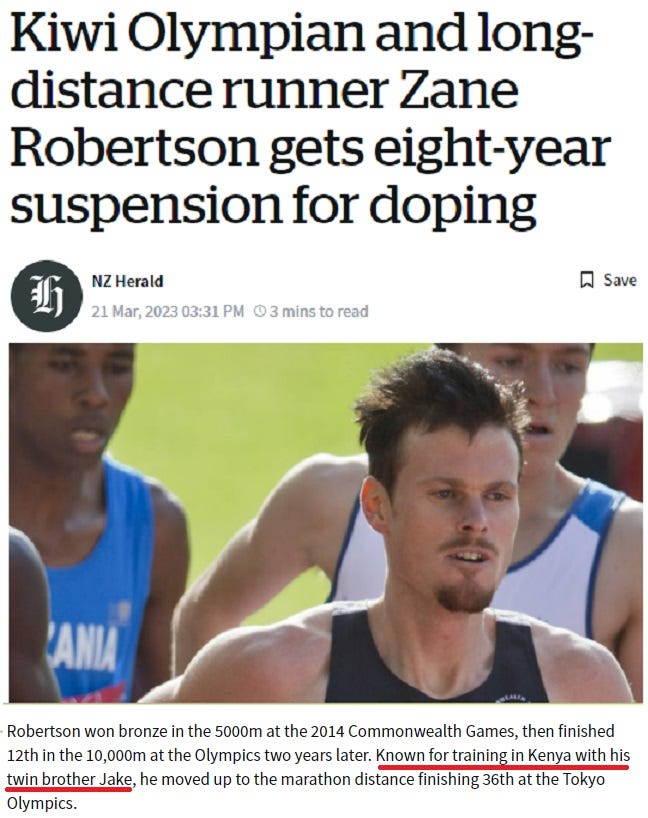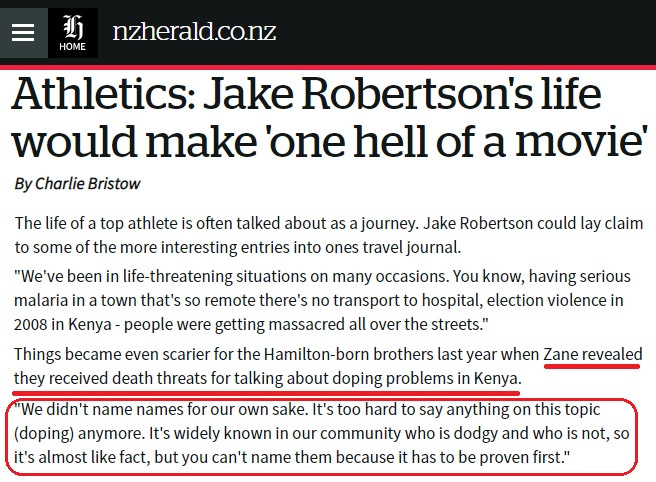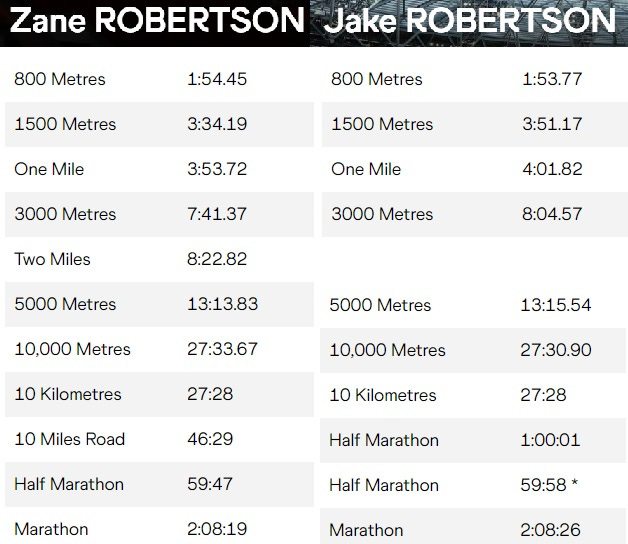Zane Robertson (13:13/27:33/2:08:19) just got eight years in the athletics cooler; his twin brother and training partner (13:15/27:30/2:08:26) just got nervous
What could be the last spring of distance running I'll ever watch or write about is off to an appropriate start
Zane Robertson, 33, has recorded the fastest-ever marks by a New Zealand athlete in the marathon (2:08:19) and half-marathon (59:47) and has spent a great deal of time since 2007 training in Kenya with his brother. On Tuesday, Robertson was suspended for eight years for a combination of doping and lying to New Zealand athletics officials.
After testing positive for EPO last year, Robertson forged some slapstick-caliber documentation “affirming” that he had been administered the drug in Kenya at the same time he had received a covid jab there, a fantasy-land addition to the mRNA mix that would have arguably made the shots safer and more effective worldwide. This transparently desperate chicanery automatically doubled Robertson’s minimum suspension from four to eight years.
(And once again, people of color—this time members of what is largely a subsistence economy—were made unlikely scapegoats for a white man’s blithely hypocritical moral decadence. Enough, I say.)
Robertson isn’t the first runner to make up an absurd story after a positive doping-control test; at that point, why the hell not?
Robertson is also not the first to be popped for doping after assuming a publicly vehement anti-doping stance. In 2016, he called for other athletes to turn in known performance-enhancing-drug users, and the next year he said he’d received death threats for “talking about doping problems in Kenya.”
But Zane Robertson might be the first world-class distance runner with a twin at the same level to be suspended for doping. In fact, Jake Robertson is essentially Zane’s aerobic as well as genetic duplicate.
Right now, two possibilities emerge. One is that Jake Robertson was the “control group” in a small, meant-to-be-kept-secret experiment, and EPO doesn’t actually work at all, at least not on Kiwis. The other is that Jake is luckier than Zane, better at tampering with incriminating evidence, or both. Either way, it’s difficult to imagine 33-year-old Jake Robertson continuing to run professionally with both his training partner ousted from the competitive pool and his credibility suddenly thrown into unavoidable question, or really, into tatters.
The chief officer of Athletics New Zealand, Pete Pfitzinger, said that his organization (or “organisation”; Pfitzinger is from Upstate New York, but the NZ media refuse to honor this) has been prepared to lend Zane Robertson mental-health support since learning it would likely be suspending him:
“As soon as he received notification of the positive test for EPO last year, we offered and have provided extensive wellbeing support alongside High Performance Sport New Zealand and we will continue to provide support during this challenging time.”
With or without this, Pfitzinger is just a solid guy as well as the whole reason I ever coached anyone online. In late 2002, he was not yet involved with Multisport New Zealand (one of the posts he held before his current one) and was looking for someone to build and manage a coaching website for him in exchange for free coaching from a two-time U.S. Olympian.
Scott Douglas—who by then had already authored not one but two books with Pfitzinger, knew me as a fellow Running Times senior writer and half-assed Web designer, and was aware I was intent on trying to reach the Olympic Trials in the marathon—suggested me as a candidate, brokering what would become a years-long, transnational partnership. (Douglas, still a busy man, would later cause a book called Run Strong to have my name on its cover.)
For the first few years of this, Pete was the only one coaching people, while I just maintained the site; I was averse to the idea. For a while, this was one of the few sites that would come up in a hunt for online running coaching using a then-young Google Search platform. Today, everyone is a coach, when means no one is, which is only one of the reasons I like the idea of doing it even less than before. Like tutoring or any form of offering instruction, it feeds my sense of taking something for nothing, especially when clients run poorly or flop in exams, and in particular when I have become friends with those clients.
This appears to be the first-ever Internet Archive capture of the coaching site, and here’s one from almost five years later. If I see these displays as “old,” I remind myself that when I started running, in the increasingly germane year of 1984, thirty-nine years had elapsed since the end of World War II. Thirty-nine more have passed since.
And looking at those archived eyesores—which naturally have typos visible and therefore did in their original, live-on-the-Web states—combined with how society stands today reinforces two strengthening and recurrent beliefs: that I wasted my life on fun but disproportionately nonremunerative nonsense even when I had my act together, and that I shouldn’t and in most moments don’t regret this.
I was never inspired to serve or impress anyone at scale, and with the state of global affairs having become too precarious to contemplate with even bleak humor—getting nastier and more hopeless by the sunset—it probably would have all for precisely nothing even had I been aimed in a more “productive” direction.
I feel as though everything useful I and everybody else now does outside our little circles is being obliterated—washed into oblivion by a flood of insane conflicts foreign and domestic with their own hellish, unguided momentum. I draw both ongoing solace and wallop of misery from keeping a connection to the world and its actors by writing about them, and I never know at any moment which will predominate. I can't decide whether knowing I have plenty of frustrated company is comforting or just another dire sign.
At least the only stimulant I’ve ever used to power my aimlessness is caffeine, and even then in mostly peaceful amounts.




